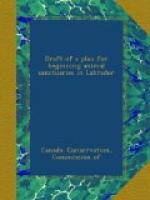Its natural features are not the only strange things in it. It is a curiosity of government, or, rather, of the want of government. It is in the Province of Quebec and in the Dominion; yet, in one sense, not of either. For it in the only place of its kind inhabited by educated whites, in any part of the self-governing Empire, where no man has ever cast a single vote or ever had the right to cast one. The electoral line stops short at Natashquan, 36 miles west of Kegashka. So 1200 good Canadians have no vote. They are dumb and their two governments are deaf. They have bought their little holdings from the Province; and they pay Canadian custom dues to the Dominion, on everything they get from the Quebec truck traders or the Hudson Bay posts, in exchange for their fish and fur. But they do not enjoy even the elementary right of protection from depredation committed by men who have no claim on Canada at all. Let me add that by this I do not mean for one moment to abuse my friends the Newfoundlanders. A kindlier people I have never met. Nor do I mean to abuse the Americans and Nova Scotians who sometimes slink inside the three-mile limit. But I do mean to draw attention to the regrettable fact that the absence of all wild-life conservation is becoming ruinous to everyone concerned—even to the exterminating Newfoundlanders, who are now making our shores as bleak a desert as they have made their own.
Of course the Canadian Labrador should help itself. Let it form a “Neighbourhood Improvement Association” under the Commission. There are good leaders in Dr Hare, the head of the medical mission; in the three religious missions—Anglican, Presbyterian and Roman Catholic; and among the principal fishermen, who are mostly Anglo- but partly French-Canadian. What the coast needs is not coddling and charity but conservation and protection against depredators from outside. The best way to begin is to protect the seabirds. And the best body to do this is the Commission of Conservation. The Province of Quebec has just put the finishing touch to a great work by establishing an animal sanctuary in the heart of the Laurentides National Park. It is also doing good work by making the game laws more effective elsewhere. But, being dependently human, it can hardly pass over the whole North Shore of voters in order to give special protection to the little, voteless No-Man’s-Land of the Canadian Labrador; though immediate special protection is a very vital concern to that most neglected part of Canada. The Dominion stops short by water as decidedly as the Province does by land. So an ideal place is left defenceless between the two, as if expressly made for the Commission to conserve.
I know that the Commission cannot undertake any executive work of a permanent character. But it can undertake an experimental investigation for a term of years. And, here again, the Canadian Labrador offers a perfect field. For if only five years’ effective conservation is extended to the bird life of that coast the whole situation will be saved. I do not presume to lay down the law on the subject. But I would venture to suggest that some such plan as the following would probably be found quite effective at the very moderate cost of five thousand dollars a year.




